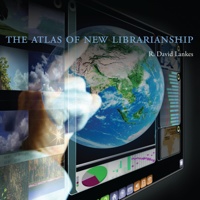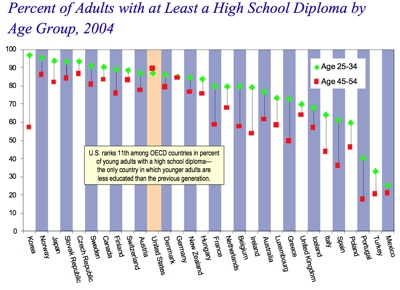The first of the threads focuses on the mission of librarians and the importance of a worldview…
Structure of the Atlas
The following video talks about the structure of the Atlas and how it works:
By the way, If you are wondering why the video is in portrait and not landscape – it has to do with their use on the iPad app.
Run Up to the Atlas
The Atlas of New Librarianship will be officially announced (and sold) at this year’s ACRL conference in Philadelphia on March 31st at 2. If you have followed this blog you know what the Atlas is, and have been seeing the creation process of the book, the companion website, and the companion iPad app. To get ready for the launch, I wanted to take the next two weeks to give you a taste of the Atlas and the companion content.
Over the coming days I’ll post video clips introducing the different threads and section of the Atlas. Today I’d like to share the introductory video for the companion site:
Awesome Librarians
“Awesome Librarians” ILEADU Kickoff, Springfield, IL.
Slides: https://davidlankes.org/rdlankes/Presentations/2011/ILEADU2.pdf
Audio: https://davidlankes.org/rdlankes/pod/2011/ILEADU2.mp3
Screencast:
Cute as an Atomic Bomb
OK, first you must watch this video. It is at the very least, adorable:
Now, reflect on what you just saw. A kid (10 maybe?) talking about using AutoCAD to make a 3D object. What’s more, talking about using an open source self-replicating 3D printer. Do not simply dismiss this as one extraordinary kid (though I’m sure he is). This technology is coming to your home and your children. We are entering the day when a 10 year old can design the next action figure, lego, or vehicle, and then email it to their friends. Not consumer, not producer, but participant in a creative community.
Imagine your dishwasher breaks and you call the manufacturer. Instead of mailing you the part, they email it to your printer. Are librarians ready for that? Imagine a member walking in to your library with the idea for the next great gadget. You can help them research it, make it, and then build a community around it. This is facilitating knowledge as much as giving them a “how to” book.
Thanks to Stephen Abram for the link, and thanks to Meg Backus who saw this coming years ago.
YES! How Librarians Should Be Promoting Their Value
I love it…a library pushing people and conversation, not artifacts and buildings. You rock Edmonton:
Sneak Peek at Atlas Companion
I’ve done a quick screencast of the companion website and iPad app I’m working on for the forthcoming Atlas of New Librarianship. Please be kind, it is very much a work in progress:
A sneak peek at the coming web and iPad companions to the Atlas of New Librarianship.
Atlas Update

For new readers of my blog, my new book, The Atlas of New Librarianship, is being co-published by MIT Press and ACRL this spring. You can follow the links in this post to more about the content of the book. This post is to give folks an update on where we are in production.
First, we have a cover! If you are reading this post, you are seeing it.
Secondly, we have a date! The book is being launched at the ACRL 2011 (http://www.ala.org/ala/mgrps/divs/acrl/events/national/2011/). It then will be on sell starting in April.
Thirdly, work has started on a series of Atlas companion pieces like a website and iPad app. To keep up and ask questions feel free to follow along at http://newlibrarianship.org. Half of the book will be available full text, plus places to keep evolving and discussing the Atlas and New Librarianship, plus new indexes and video. You can also join us on Facebook at http://www.facebook.com/apps/application.php?id=169908193049267. Both of these spaces are still very much a work in progress, so don’t expect too much life until March.
Lastly, a special shout out to MIT Press and ACRL. This is going to be a beautiful book 10″x10″ full color with a pull out poster/map and only $55 at about 500 pages. Also a special thanks to the literally hundreds of librarians that have been part of the process and ideas in the Atlas.
We’ve also already gotten some nice reviews:
“Deep thinking, beyond brands, down to the core concepts and competencies that define librarianship. Lankes creates thoroughly described verbal and visual explanations of the relationships between the many disparate parts that make up our professional whole.”
—Jessamyn West, community technology librarian, blogger, and creator of librarian.net“The Atlas is not a book; it is a manifesto, a set of principles and convictions aimed at shaking new life and belief into a field that too often fears for its own future. Read it and be prepared to act.”
—Andrew Dillon, Dean and Louis T. Yule Regents Professor of Information, School of Information, University of Texas at Austin
So feel free to follow along and take a look at the MIT Press page for the book.
More soon.
Beyond the Bullet Points: Scary Picture
One of the great joys I have is visiting with very cool librarians. I got that chance in Delaware last week. The State Library is kicking off a stimulus broadband project with the Gates Foundation; public libraries around the state; state agencies in workforce development, adult education and volunteer services; and businesses.
During the kickoff Maureen Whelan, State Director of Adult Education showed the following graph (explanation after the picture) that is simply chilling:
Those red dots are folks 45-54 that have a high school degree. The green dots are folks 25-34 with a high school degree. All of these are arranged by country. Now the chilling part. If you look across the graph note the one big difference with the United States. It is the only country listed where the red dot is above the green dot…the only country where the older generation has more education than the younger generation. The parents are more educated than the children.
Now I realize there are many factors here…as a country we have a lot of folks with high school degrees already for example (hence while Germany is close to even), but there is still a long way to go to 100% of the population has at least a high school diploma.
I’ve been doing a lot of thinking about grand challenges recently – big complex goals that are hard to achieve, but can have major positive impacts on society. How we educate ourselves is clearly one and librarians have a huge role to play.
For more on this graph: http://www.nationalcommissiononadultliteracy.org/content/nchemspresentation.pdf
Libraries and Broadband: Forging a New Social Compact
“Libraries and Broadband: Forging a New Social Compact” Delaware Library BTOP Launch, Newark, DE.
Abstract: The time for introspection is done. The time for trivia is done. The time for looking for the future of libraries in catalogs, and strategic plans is done. The needs of our communities is too great, and our promise for improvement to large. Our families worry about jobs and the ability to fight their way into a shrinking middle class. Our education system is broken – students unable to learn, or drowning under crushing debt. Our system of government increasingly polarized, our appetites for energy unsustainable, and the very memory of our society eroding behind walls of commerce and false scarcity and obsolescence. These then are among our grand challenges.
And I know what you are thinking. I know that tomorrow you’ll be dealing with broken printers, and shelving backlogs, and the rising costs of subscriptions. But you must look up. You must never make what you do replace why you do it. And if you can’t link broken printers and shelving to the grand challenges of our society, then you ought to ask why you are doing them. We must stop reacting to the world around us and start inspiring it!
For too long have we defined the core of our profession – service – as standing ready to serve. No one ever changed the world by standing ready. We do it through action. This is the time – this is the place – we are the people.
Slides: https://davidlankes.org/rdlankes/Presentations/2011/Delaware-Lankes.pdf
Audio: https://davidlankes.org/rdlankes/pod/2011/Newark.mp3
Screencast:

